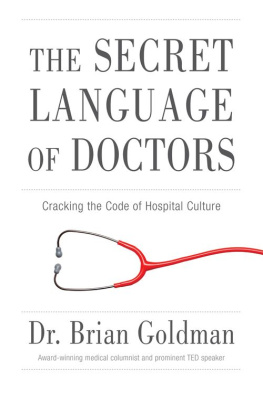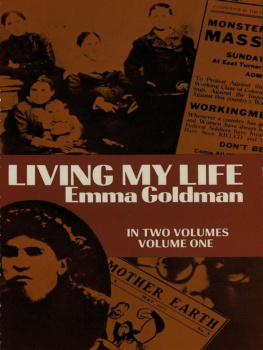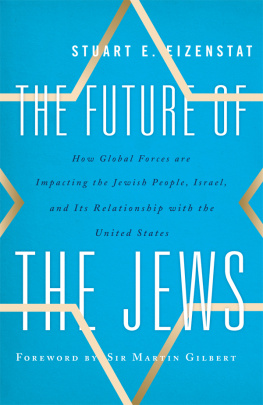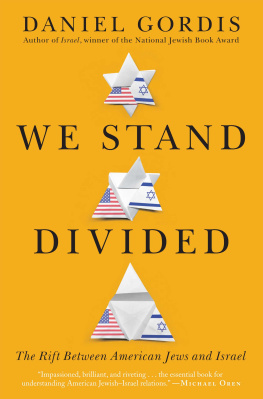Gods Country
Christian Zionism in America
Samuel Goldman

Haney Foundation Series
A volume in the Haney Foundation Series, established in 1961 with the generous support of Dr. John Louis Haney
Copyright 2018 University of Pennsylvania Press
All rights reserved. Except for brief quotations used for purposes of review or scholarly citation, none of this book may be reproduced in any form by any means without written permission from the publisher.
Published by
University of Pennsylvania Press
Philadelphia, Pennsylvania 19104-4112
www.upenn.edu/pennpress
Printed in the United States of America on acid-free paper
10 9 8 7 6 5 4 3 2 1
Library of Congress Cataloging-in-Publication Data
Names: Goldman, Samuel, author.
Title: Gods country : Christian Zionism in America / Samuel Goldman.
Description: 1st ed. | Philadelphia : University of Pennsylvania Press, [2018] | Includes bibliographical references and index.
Identifiers: LCCN 2017037678 | ISBN 9780812250039 (hardcover : alk. paper)
Subjects: LCSH: Christian ZionismUnited StatesHistory. | Christianity and other religionsUnited StatesJudaismHistory. | JudaismRelationsUnited StatesChristianityHistory. | Religion and politicsUnited StatesHistory.
Classification: LCC DS150.5 .G64 2018 | DDC 261.20973dc23
LC record available at https://lccn.loc.gov/2017037678
Contents
On March 4, 2002, Senator James Inhofe rose to address the United States Senate on the topic of peace in the Middle East. The occasion was a proposal by Saudi Crown Prince Abdullah, under which Arab states would normalize relations with Israel in exchange for its withdrawal from territories occupied after the Six-Day War and the establishment of a Palestinian state. Inhofe argued against American endorsement of the deal. If this is something that Israel wants to do, it is their business to do it, Inhofe said. But anyone who has tried to put the pressure on Israel to do this is wrong.
Inhofe explained that it would be wrong to put pressure on the Jewish State because Israel is entitled to the land they have.... [I]t should not be a part of the peace process.
Yet Inhofes ultimate rationale was not based on history, humanitarianism, or strategic considerations. In a final argument, he proposed that we ought to support Israel and oppose territorial adjustments because it has a right to the land. This is the most important reason: Because God said so.
In 2006, Hagee put his beliefs into practice by founding Christians United for Israel (CUFI), which claims membership of more than a million.
It is tough to define Christian Zionist. According to historian Shalom Goldman, the term was coined by Theodor Herzl to describe the Swiss banker When Herzl described Dunant as a Christian Zionist, he seems to have meant that Dunant was a European non-Jew sympathetic to Zionism.
The Zionist intellectual Nahum Sokolow used the term in a similar way. In his History of Zionism, 16001918, Sokolow applied it to the British army officer George Gawler, who acted as traveling companion to Moses Montefiore during the Jewish philanthropists 1849 visit to Ottoman Palestine.
For most of the twentieth century, the formulation Christian Zionist was rarely seen on this side of the Atlantic. In this contexta report of the foundation of an organization called the International Christian Embassy in Jerusalemthe emphasis was on religion rather than politics. Reflecting the unfamiliarity of the link, the headline placed the term in quotation marks.
As Spector observes, neither approach to explaining what it means to be a Christian Zionist is satisfying. Definitions like Herzls pay insufficient attention to religious concerns. By treating Christian as a synonym for Gentile, they downplay the role of beliefs about an inextricable connection between Christian faith, the Jewish people, and the Land of Israel. Many non-Jews have supported Zionism and Israel for a variety of reasons. But they have not all been Christian Zionists.
More restrictive definitions, on the other hand, associate Christian Zionists too closely with specific theological commitments. Journalist Victoria Clark, for example, argues that Christian Zionists believe that the Bible is literally true and gives Jews a right to sovereignty over all the lands promised to Abraham.Christians who support Israel today or have endorsed Zionist projects in the past on the basis of very different understandings of Gods word and will.
All definition is, to some extent, arbitrary. The important question is not whether a particular verbal tag covers all conceivable cases, but whether it provides a basis for further inquiry. With that consideration in mind, this book follows Spector in using the term Christian Zionist to describe supporters of a Jewish state in some portion of the biblical Promised Land who draw their main inspiration from Christian beliefs, doctrines, or texts. Christian Zionism, in turn, refers to those motives, authorities, and sources. This flexible approach to definition will be vindicated if the book sheds light on the thought and actions of Christians who played an important role in justifying, promoting, and even inspiring Zionism in its more familiar sense.
Where does Christian Zionism come from? Mearsheimer and Walt join a considerable number of scholars who derive Christian Zionism from the theological movement known as premillennial dispensationalism. The basic idea of premillennial dispensationalism is that history is composed of stages that culminate in the return of Jesus Christ to establish the millenniumthe thousand-year reign of peace described by the Book of Revelation. This idea was systematized in the mid-nineteenth century by the Anglo-Irish theologian John Nelson Darby and promoted in the United States by evangelists including Dwight Moody and Cyrus I. Scofield.
The anticipation of a personal Second Coming is not what sets premillennial dispensationalism apart from other Christian eschatologies. Its most distinctive feature is the sequence of events that it places in the period preceding Christs return to set up the millennial kingdom. Drawing on prophecies from the Old Testament as well as Revelation, the dispensationalist timeline includes the return of the Jews to their land, so-called Rapture of the faithful directly into heaven, and an escalating series of upheavals culminating in the battle of Armageddon. Early expositors described these aspects of premillennial dispensationalism in rather vague terms. But they have received vivid and detailed depiction in more recent works, including the 1970s best-seller The Late Great Planet Earth and the Left Behind novels coauthored by Christian Right activist Tim LaHaye.
John Nelson Darby wrote decades before the establishment of the organized Zionist movement and disclaimed interest in politics. But many Christians influenced by his teachings number the location and condition of the Jewish people among the signs of the times that mark steps toward the completion of Gods plan. According to journalist Gershom Gorenberg, for those who accept the dispensationalist doctrine, as so many evangelicals do, its natural to proclaim love of the Jewish State. Israels existence gives a believer the warm feeling that the world is behaving as he or she expects it to. As Gorenberg emphasizes, that love has a dark side. Dispensationalists describe the period leading up to the Second Coming as a grim tribulation. During this phase, they foresee increasing disorder, war, and pestilence. All who are not Raptured suffer these calamities, but Jews and Israel are subject to particularly intense anguish. In some versions of the story, the majority of the worlds Jews perish before Christ returns.















